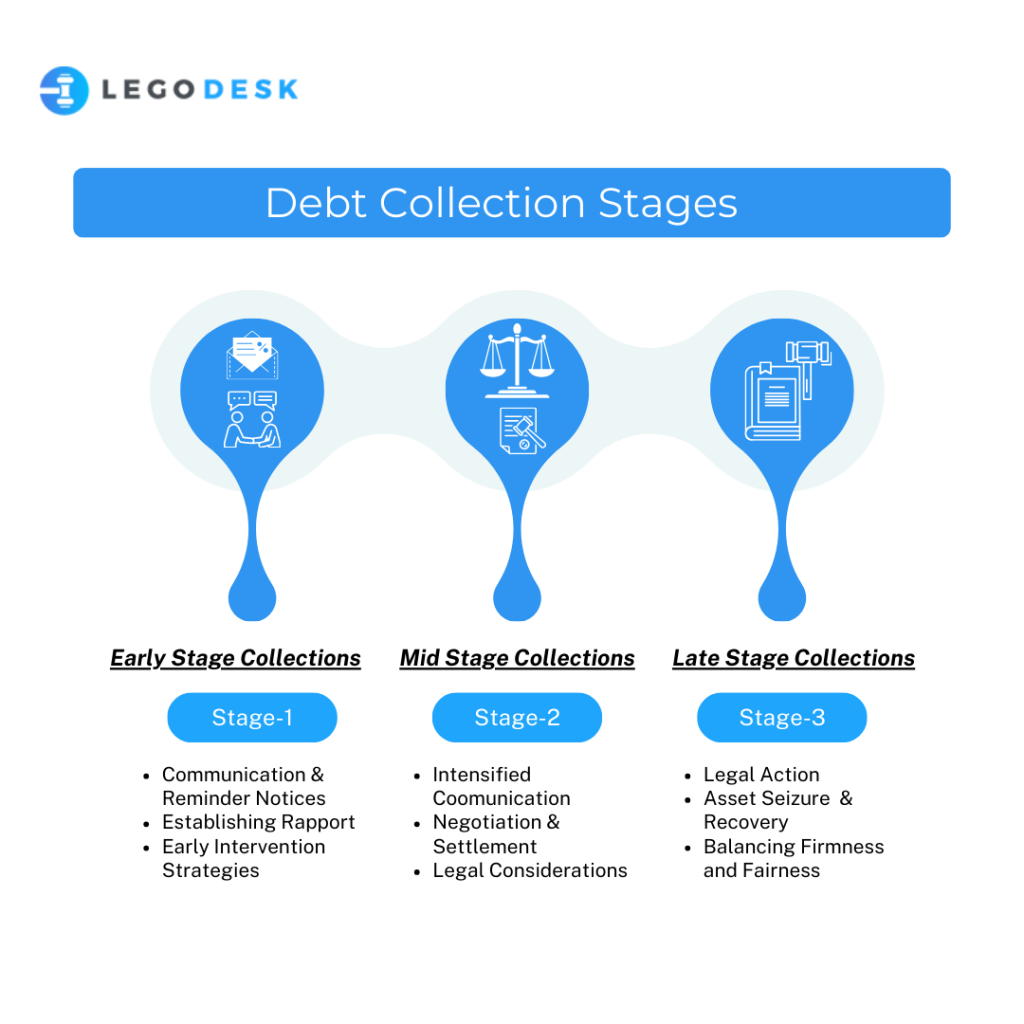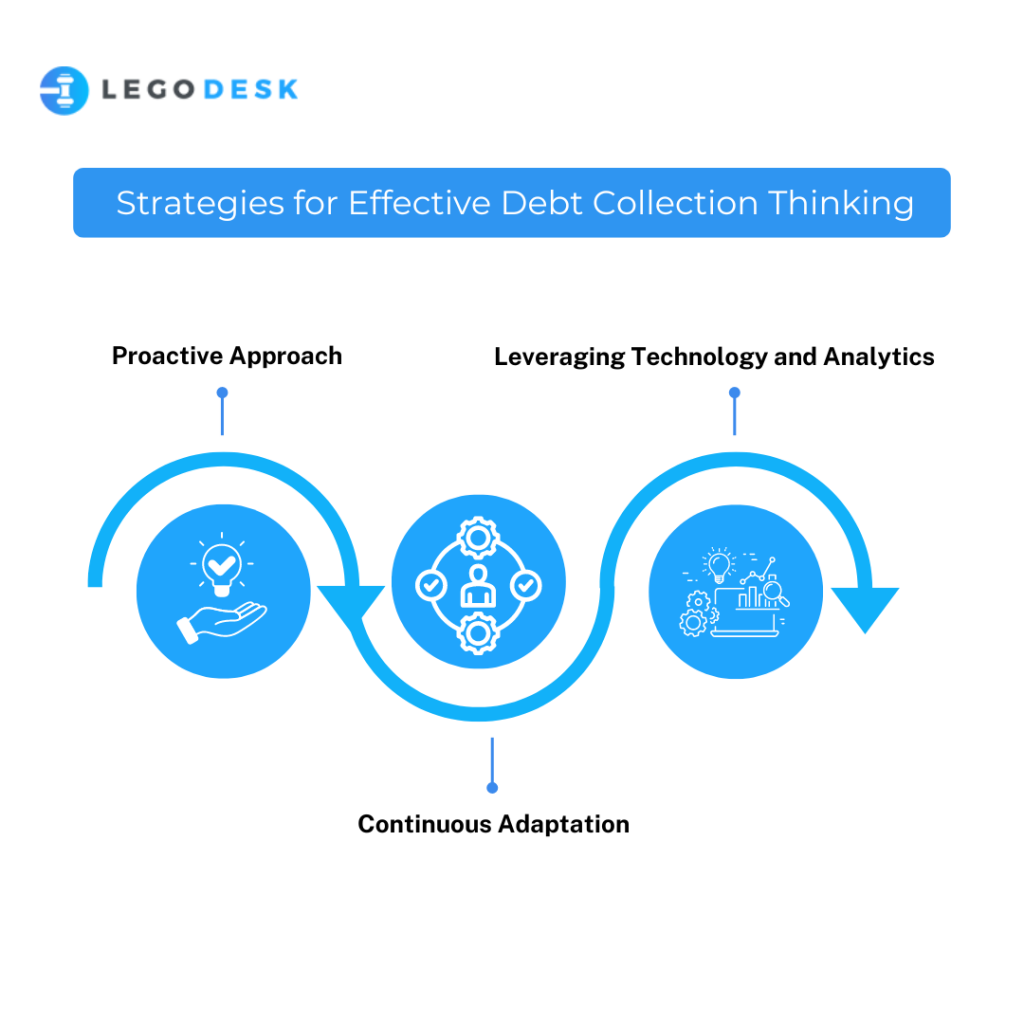Debt Collection Stages: How Collectors Think?
Effective debt collection is crucial for the financial health of businesses. It involves systematically navigating through various debt collection stages to recover outstanding debts. The significance lies in maintaining cash flow, minimizing financial risks, and ensuring the long-term sustainability of the business.
Debt collectors play a crucial role in recovering unpaid debts, and understanding their perspective can shed light on the intricacies involved. In this article, we will delve into the different debt collection stages in India and explore how collectors navigate each phase.
The Collector’s Mindset
Understanding the collector’s mindset is pivotal for devising strategies aligned with both the business’s financial goals and the nuanced behaviors of debtors. This involves recognizing the delicate balance between assertiveness in debt recovery and ethical practices to create a successful and sustainable debt collection process.
II. Debt Collection Stages

Stage 1 – Early Stage Collections (Less than 30 Days Past Due):
Early-stage collections involve debts that are still relatively fresh, typically less than 30 days past the due date. During this phase, collectors adopt a proactive approach aimed at preventing the escalation of delinquency. Key considerations in this stage include:
1.1 Communication and Reminder Notices:
Collectors initiate communication with debtors through polite reminders, emphasizing the importance of timely payments.
Reminder notices are often sent via email, SMS, or letters, outlining the outstanding amount and due date.
1.2 Establishing Rapport:
Building a positive relationship with the debtor is crucial at this stage. Collectors aim to understand the debtor’s circumstances and address any potential issues that may hinder timely payments.
1.3 Early Intervention Strategies:
Collectors may offer flexible repayment plans or negotiate settlements to encourage prompt resolution.
Emphasis is placed on educating debtors about the consequences of prolonged delinquency.
Stage 2 – Mid-Stage Collections (30-90 Days Past Due):
As debts progress into the mid-stage, falling between 30 to 90 days past the due date, collectors adapt their strategies to address the evolving nature of delinquency. Key aspects of this stage include:
2.1 Intensified Communication:
Collectors may increase the frequency and assertiveness of communication to convey the urgency of settling the debt.
Phone calls and personalized messages become more prevalent in an effort to expedite the resolution process.
2.2 Negotiation and Settlement:
Negotiation skills come to the forefront as collectors work towards mutually beneficial agreements.
Settlement offers and structured payment plans are presented to debtors, aiming to strike a balance between recovery and debtor satisfaction.
2.3 Legal Considerations:
In some cases, collectors may begin evaluating the feasibility of legal action, considering the potential risks and costs involved.
Stage 3 – Late Stage Collections (Over 90 Days Past Due):
Late-stage collections involve debts that have extended beyond 90 days, posing increased challenges and complexities. At this critical juncture, collectors employ strategic measures to recover outstanding amounts:
3.1 Legal Action:
If negotiations prove unsuccessful, collectors may initiate legal proceedings to secure a court judgment.
Legal action serves as a last resort, often prompting debtors to prioritize repayment to avoid legal consequences.
3.2 Asset Seizure and Recovery:
In extreme cases, collectors may explore options for seizing assets to satisfy the debt.
Recovery agents may be engaged to facilitate the repossession of secured assets.
3.3 Balancing Firmness and Fairness:
While collectors remain firm in pursuing debt recovery, ethical considerations and adherence to legal regulations are paramount.
III. The Emotional Intelligence of Collectors
A. Managing Emotional Responses
Collectors must manage their own emotional responses during challenging situations. Maintaining professionalism and focusing on the end goal are essential for effective debt collection without compromising emotional well-being.
B. Empathetic Communication
Understanding debtors’ perspectives and employing empathetic communication techniques enhance cooperation and increase the likelihood of successful debt recovery. This involves actively listening, acknowledging concerns, and demonstrating understanding.
IV. Strategies for Effective Debt Collection Thinking

A. Proactive Approach
Adopting a proactive mindset involves identifying potential risks early in the debt collection process. Taking preemptive measures to prevent further delays helps in maintaining control and optimizing the debt recovery timeline.
B. Continuous Adaptation
Remaining flexible and adapting strategies based on debtor responses and market dynamics is crucial for successful debt collection. Collectors must stay agile, adjusting their approach as needed to address evolving challenges and debtor behaviors.
C. Leveraging Technology and Analytics
Collectors use technology and analytics to streamline processes, make informed decisions, and enhance overall efficiency. Integrating artificial intelligence and machine learning contributes to reshaping debt collection process, making them more effective and data-driven.
V. Challenges Faced by Collectors
Diverse Regulatory Landscape:
India has a diverse regulatory environment with both national and state-specific laws governing debt collection. Navigating through these various regulations can be complex, and staying compliant with the Reserve Bank of India (RBI) guidelines and other local laws is crucial for debt collectors.
Cultural Sensitivities:
India is a culturally diverse country with various languages and customs. Debt collectors must be sensitive to cultural nuances to effectively communicate with debtors and establish rapport. Understanding regional differences and adapting collection strategies accordingly is essential.
Informal Debt Resolution Practices:
In many cases, informal debt resolution practices are prevalent in India, where debtors may negotiate directly with creditors. Debt collectors need to be aware of these practices and adapt their strategies accordingly. Engaging in respectful and constructive negotiations becomes particularly important.
Technological Accessibility:
While technology is advancing in India, there might still be challenges in terms of technological accessibility in certain regions. Debt collectors need to consider the varying levels of technological infrastructure to ensure effective communication and data management.
Economic Disparities:
India has significant economic disparities, with a wide range of income levels across its population. Debt collectors may encounter debtors facing financial hardships, making it essential to adopt flexible and empathetic approaches to debt resolution.
VI. Future Trends in Debt Collection Process

A. Technological Advancements
Continued integration of technology, such as artificial intelligence and machine learning, is reshaping debt collection process and enhancing efficiency. This involves utilizing advanced tools for predictive analytics, automation, and enhanced decision-making processes.
B. Enhanced Training and Education
Investments in ongoing training and education are crucial for collectors to stay abreast of evolving debt collection methods and regulations. Continuous learning ensures that collectors are well-equipped to adapt to changes in the industry and legal landscape.
C. Focus on Customer-Centric Collections
The future of debt collection will likely see an increased emphasis on customer-centric approaches. This involves aligning debt collection practices with ethical standards and fostering positive debtor experiences to improve overall satisfaction and cooperation.
VII. Conclusion
Understanding how collectors think is pivotal for businesses aiming to optimize debt collection stages. By embracing a balanced mindset, leveraging emotional intelligence, and adapting to evolving trends, collectors can navigate the complex landscape of debt recovery successfully. Ultimately, a strategic and empathetic approach benefits both businesses and debtors, fostering a healthier financial ecosystem.
Frequently Asked Questions (FAQs)
What is the significance of debt collection stages in financial management?
Debt collection stages are crucial for maintaining cash flow, minimizing financial risks, and ensuring the long-term sustainability of businesses through effective recovery of outstanding debts.
Why is the collector’s mindset important in debt collection?
The collector’s mindset is essential for devising strategies aligned with both the business’s financial goals and the nuanced behaviors of debtors, striking a balance between assertiveness and ethical practices.
How do collectors prepare in the pre-collection stage?
Collectors prepare by conducting in-depth research on debtor profiles, assessing legal frameworks, and understanding the regulatory landscape to ensure compliance.
What is the significance of establishing contact during the early stage of debt collection?
Establishing contact creates a positive impression, encouraging open communication and setting the foundation for a successful debt recovery process. How do collectors negotiate flexible payment plans during mid-stage collections?
In mid-stage collections, collectors focus on categorizing debtors based on risk factors and negotiating flexible payment plans, considering financial challenges while maintaining a commitment to recovery.
Why is emotional intelligence important for collectors?
Emotional intelligence helps collectors build rapport, manage emotional responses, and employ empathetic communication techniques, enhancing cooperation and increasing the likelihood of successful debt
Try our Debt Resolution solutions today Request a Demo
